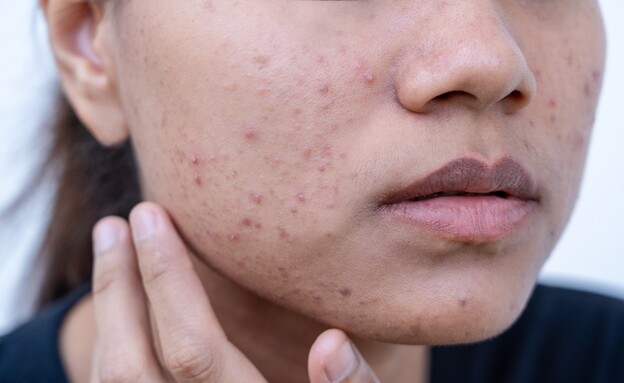There is no fixed age at which sexual maturity begins, and the pace of development differs from child to child. For most girls, the process begins between the ages of 8 and 14, and for boys between the ages of 9 and 14. In most cases, girls will develop faster than boys.
acne
The sebaceous glands in the skin secrete sebum in an increased amount following the hormonal changes during puberty. Dead skin cells that block the sebum exit openings from the hair follicles can cause the accumulation of sebum and the formation of “blackheads” or pus-filled pimples. The acidity level also changes and the bacteria on the skin thrive and tend to enter the hair follicles and create local inflammations.
So what can be done?
Using face soap or lotion twice a day. If the skin is oily, it is recommended to use a lotion or non-soap designed for young skin, without fat. There are also hypoallergenic facial soaps for sensitive skin.
Cosmetic preparations adapted to oily skin – it is recommended to choose preparations such as moisturizing cream adapted to oily young skin, to prevent further accumulation of fat on the skin.
Examples of non-prescription external preparations
- benzoyl peroxide – has antibacterial activity, for the treatment of mild acne. Apply the preparation on dry and clean skin once or twice a day.
- Dermacosmetic preparations in the form of a gel that dry the pimples in a spot-on manner, for mild cases without inflammation.
External preparations with a prescription
Retinoids – a derivative of vitamin A, help remove the skin cells that block the hair follicles. The preparation is available in the form of cream or gel, in two concentrations. Apply to dry and clean skin, once a day before going to bed.
Clindamycin – an antibiotic with antibacterial activity that damages bacteria on the surface of the skin and thus reduces the inflammatory process in pimples.
Adeplan – a preparation for application that affects the growth of skin cells, has anti-inflammatory properties. For the treatment of acne with local inflammation. Apply to dry and clean skin once a day before going to bed.
Prescription drugs to swallow
Isotretinoin – retinoid. The active substance works in several mechanisms and causes a reduction in the production of sebum, a decrease in the amount of bacteria and cells blocking the skin and a decrease in the characteristics of inflammation in pimples. The drug is intended for the treatment of severe acne, after attempts to use other drugs. There are some side effects such as skin sensitivity to the sun, dryness in the skin and mucous tissues, muscle pain and more. You must adhere to the precautionary instructions with the medicine as they appear in the leaflet. The treatment lasts several months, during which blood tests for liver function must be performed.
Antibiotics from the tetracycline family – have antibacterial activity on the skin, which causes a decrease in local inflammation symptoms. The active ingredients in Israel are usually minocycline or doxycycline. The treatment usually lasts up to three-four months of treatment, depending on the condition of the skin, and will usually be combined with a local treatment on the skin such as benzoyl peroxide or another substance.
The medicine should be taken while standing or sitting, but not lying down, and one should not lie down for half an hour after taking the medicine. Can be taken with food if stomach irritation occurs after taking. The drugs cause increased sensitivity to the sun and appropriate protective measures must be used.
All acne treatment products can cause dry skin and/or sensitivity to the sun, so you should avoid prolonged exposure to the sun and apply sunscreen daily.
body odor
Apocrine sweat glands found in the armpits, breasts and genitals grow during puberty. These glands secrete sweat, which can sometimes cause unpleasant body odor. The sweat helps the body to lower the body temperature when it starts to heat up like during physical activity.
What can be done to avoid the smell?
- Daily bathing and use of appropriate body soap
- Wearing clothes made of natural fabrics such as cotton or sweat-wicking materials
- Daily use of deodorant – there are preparations that prevent sweating (antiperspirant) or preparations that are not antiperspirants that allow sweat to be secreted and treat the bad smell. If there is a local sensitivity to the deodorant, you can try hypoallergenic preparations and/or products that do not contain perfume/aluminum.
* The information is presented to enrich the knowledge of the readers on the subject, and does not come to replace in any way a consultation with the attending physician; The determination of the drug treatment will be carried out by the attending physician only.
Bat-chen Nebo is a pharmacist, head of regulation and risk management, Maccabi Pharm
